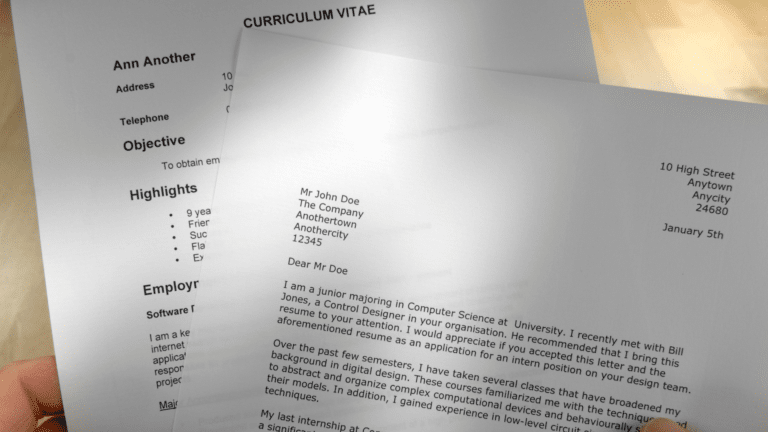The right networking opportunities can be the key to landing job offers. While a strong resume and a compelling cover letter help your application stand out, a solid professional network can establish your credibility and expertise.
Whether you are a newcomer to the workforce or an entrepreneur looking to expand your business, networking can make a significant difference in your professional journey.
Ready to grow your network and expand your social circles? Let’s get started!
Key Takeaways
- Networking opportunities are situations where professionals can connect and collaborate with people in their industry. These connections help individuals expand their professional circle, gain knowledge from industry experts, and access new opportunities to boost their careers.
- From formal events like roundtables, informational interviews, and career fairs to more informal settings like happy hours, airports, and even online spaces, there are countless networking opportunities where you can meet people and grow your professional network.
- The key to making the most of different networking opportunities is to be prepared. Events have varying purposes, so come to each one with a clear goal. Have several talking points ready, don’t hesitate to start conversations, and always be genuine in your interactions.
What Are Networking Opportunities?
Networking opportunities are events and spaces, such as trade shows, happy hours, and career fairs, where you can meet people in the same industry or profession you are in. Unlike normal meetings, networking opportunities focus on connecting like-minded professionals to help grow their careers.
In a 2023 survey by GMAC, an organization of the world’s top graduate business schools, they found that more than half of that year’s prospective MBA students pursued their degrees to build their professional network. The survey involved over 2,000 respondents from 131 countries, and with a majority of jobs filled through professional contacts, we see why.
Taking advantage of networking opportunities, meaning going to all the events you can, participating in online spaces, and building relationships with your peers, is the key to networking success.
We explore some of the best networking opportunities you shouldn’t miss below, so make sure to stick around till the end.
12 Networking Opportunities to Help You Grow Your Network
Networking isn’t just about exchanging numbers or getting new LinkedIn connections; it’s about creating meaningful and mutually beneficial relationships with your peers.
If you are striving to build your network, here are some of the best networking events and opportunities to consider:
#1. Roundtable Events
Roundtable events offer a unique networking experience, as they encourage discussions and the exchange of knowledge among the participants. These events are a great opportunity to demonstrate your expertise and build rapport with your peers.
Don’t miss out on roundtable events organized by official industry associations and professional groups. These are often structured discussions on a specific topic and involve a small group of 10-12 people, including stakeholders and organizations, allowing you to share your ideas and seek advice from industry experts.
When participating in a roundtable, don’t just be a passive listener. Ask insightful questions, contribute to the discussion, and answer some questions. Being an active participant helps you make a lasting impression and position yourself as a valuable member of the industry.
#2. Online Networking
Social media is one of the best networking opportunities in education. Sites like Twitter and LinkedIn are some of the most popular platforms for connecting and engaging with people in the same industry.
Networking on LinkedIn can yield new connections via your current ones. You can also use this site to find and connect with people in the industry you are working in.
Aside from growing your network, increasing your LinkedIn presence can also help you build your personal brand and improve your visibility.
Twitter, on the other hand, is a great place for discussing concepts and exchanging ideas with people in the same industry. Simply liking one tweet about a topic that interests you will bring you hundreds of similar tweets. You can reply to the tweet or start a private conversation with the person who tweeted it to discuss the topic further.
#3. Speed Networking
Speed networking is a combination of speed dating and networking with the goal of meeting as many people as you can in a set amount of time.
In a speed networking event, a large number of professionals gather in a room and spend a few minutes talking to another participant. The time is long enough to exchange information and discuss a few topics before you need to rotate.
To make the most of your speed-networking experience, we recommend coming prepared.
Come up with an elevator pitch that explains what you can offer and what you are looking to gain from the event, as well as highlights your expertise and background. Be sure to ask open-ended questions and listen to their answers attentively.
After the event, reach out to the contacts you made to establish a deeper connection and explore further discussions.
#4. Cold Contacting
Cold contacting may seem intimidating at first, but it can actually be a powerful way to expand your professional network. One way to do this is by reaching out to a new connection on LinkedIn. Another cold contacting method is by calling or sending an email.
Make sure to personalize your message by discussing any shared connections or recent achievements and explaining how you believe they can add value to your network.
Avoid phrases that sound too formal or like a cliché, as this can come off as disingenuous. Instead, keep the tone professional yet friendly and state the purpose of your contact clearly.
Even if they reject you or don’t respond, don’t let it discourage you. Remember to follow up once enough time has passed and express your willingness to build rapport gradually.
#5. Happy Hours
Happy hours are one of the many networking opportunities in the workplace. Unlike the previous networking events, a happy hour is a relaxed and informal event where you can unwind after work while making valuable connections.
Improving your interpersonal skills can help you make an impression during these kinds of events.
Because it’s in a casual environment with no pressure or time limit, it’s often easier to meet people during a happy hour. Conversation also flows much smoother over drinks, so it’s a good place to talk to people you would usually have trouble approaching.
Make the most of happy hour networking by being genuine in all your interactions. Keep the conversations friendly and focus on actually getting to know the other person outside of their professional title. At the end of the night, exchange contact information and follow up with the people you connected with.
#6. Non-profit Events
Attending non-profit events allows you to contribute to a worthy cause while creating networking opportunities. These types of events attract a wide variety of people who want to make an impact.
When deciding what event to attend, we recommend going to a cause you personally care about or already support. This will make it easier to start conversations, and people with similar interests will naturally want to connect with you.
As much as possible, avoid focusing on your work during conversations. Instead, share your excitement for the cause and discuss any skills that can contribute to the organization’s mission.
Discussing volunteer experience for that cause is also a great talking point. If you bring up your work, do it subtly and strategically, as it can become evident quickly that you only attended the event to broaden your network.
#7. Informational Interviews
If you are just starting out, informational interviews can be an excellent way to hone your interview skills while forging connections. Reach out to professionals in the industry whom you admire and request an informational interview.
Before the interview, we recommend doing some light research on the company to help you formulate good questions. This will help you guide the conversation and demonstrate your interest in learning from the interviewee.
During the interview, actively listen and ask follow-up questions when possible. Ask what advice they would give to someone new in the industry and seek recommendations for other types of networking opportunities. After the interview, be sure to thank them for their time and follow up with a thank-you email afterward.
#8. Career Fairs
Career fairs offer wonderful networking opportunities for college students. They allow you to meet potential employers as well as connect with different experts in the industry. Even if you attend with no plan to apply, it’s still a great way to grow your professional network.
If you are actively looking for a new job, however, it’s best to come prepared, as you will be personally speaking to a company representative. Wear the right clothes, bring several copies of your resume, and prepare a stellar elevator pitch. Be sure to research the companies you plan to talk to and come up with questions.
Although career fairs are formal events, it’s important to let your personality shine through during conversations. Approach each booth with enthusiasm and ask them about job openings or the company culture. After the event, make sure to reach out to the contacts you made and keep the conversation going.
#9. Airport Networking
If you’re a frequent flyer, airports make a fantastic place to network. You can meet all kinds of people from various industries at the airport. So, next time you are waiting for your flight or have a long layover, consider starting a conversation with fellow passengers.
Airports are relaxed environments, so keep the conversations light and casual. Get to know other travelers, share your experiences, and let the topic flow naturally toward your professional interests. Have your business card ready to easily exchange contact information in case the conversation leads to a potential opportunity.
The main goal of networking at airports is not to deliver a practiced pitch but to connect with like-minded individuals. And with the right approach, this can lead to lasting relationships.
#10. Trade Shows
Trade shows bring together businesses, professionals, and industry experts from all around the world, making them a prime networking opportunity. Whether you are attending as an exhibitor or as an attendee, trade shows are a great way to expand your network.
For entrepreneurs, trade shows provide an opportunity to meet with suppliers, partners, and potential clients. You can also showcase your products and services and form connections with individuals in the same industry.
As an attendee, be sure to take advantage of the seminars and panel discussions during the trade show to gain valuable insights and meet new people. Introduce yourself professionally, engage in meaningful conversations with both exhibitors and fellow attendees, and don’t forget to exchange business cards before leaving.
#11 Volunteering
Like non-profit events, volunteering is an excellent networking opportunity that helps you give back to the community and grow your network. Aside from meeting people outside your specific industry, volunteer experience is a great addition to your resume.
Additionally, volunteering allows you to work alongside people who share your interests and passions, which can lead to genuine connections. It can showcase your dedication, work ethic, and values to potential employers or connections. Actively engage in conversations and discuss your motivations for supporting that specific cause.
When volunteering, you will likely meet people in all stages of life, so it’s important to be open to networking with fellow volunteers and community members. Even if they don’t connect you to an immediate opportunity, they may introduce you to someone who can.
#12 Alumni Events
There aren’t very many networking opportunities for high school students and college graduates, but alumni events are one you shouldn’t miss. At an alumni event, you get to reconnect with former classmates, professors, and fellow alumni while growing your professional network.
Take advantage of these events to reminisce about shared experiences in school and catch up on career trajectories. Express genuine interest in learning about others and share updates on your own professional journey.
When starting conversations, use your alma mater affiliation as an icebreaker before smoothly moving on to other topics. Since you already have a common interest, it will be much easier to approach people. Developing networking skills can help you succeed in forming connections during this event.
Alumni networks often include diverse industries and geographical locations and can provide you with excellent advice and resources.
Final Thoughts
When done right, networking can give you countless opportunities to improve your personal and professional circles. Whether you are attending career fairs and roundtable events or volunteering and taking part in a speed networking event, the key is to be proactive and authentic.
That said, networking isn’t just about what you can gain but also how you can contribute to the lives of your connections. Keep in mind that every networking opportunity has its own benefit, and by always being open to new connections, you can build lasting relationships and discover new opportunities.
Growing your network doesn’t happen overnight. Create meaningful connections and follow up on initial contacts to foster and expand your network over time.










